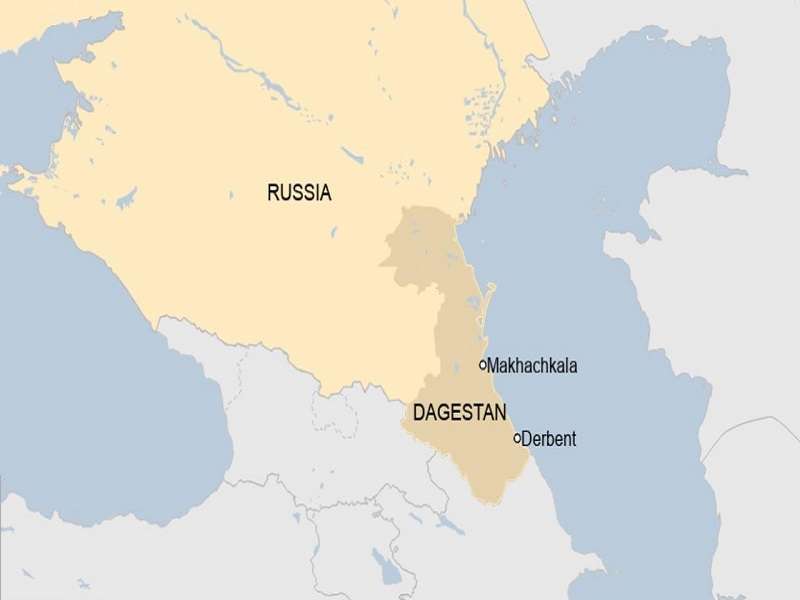The southern Russian region of Dagestan was hit by several terrorist attacks in Sunday after armed militants targeted a churches, synagogues, and a traffic police post in two separate cities. Abdulkhakim Gadzhiyev, who’s one of that region’s representatives in the Duma, promptly blamed Ukraine and NATO. Former Roscosmos chief and incumbent Senator from Zaporozhye region Dmitry Rogozin, however, politely rebuked him shortly thereafter in a Telegram post that reads as follows:
“State Duma deputy from Dagestan Gadzhiev believes that the terrorist attack in the republic was carried out by the special services of Ukraine and NATO countries. And I believe that if we blame every terrorist attack based on national and religious intolerance, hatred and Russophobia on the machinations of Ukraine and NATO, then this pink fog will lead us to big problems. We see a speck in someone else’s eye, but we don’t see a log in our own. And it’s about time.”
This isn’t the first time that Dagestan is in the news for all the wrong reasons since a slew of radicalized locals tried storming the regional capital’s airport last fall after being misled by foreign-emanating fake news on Telegram into thinking that a bunch of Jewish refugees were about to arrive there. That incident was comprehensively analyzed here at the time, which concluded that it was a hybrid provocation by Russia’s adversaries that exploited some of the population’s predilection for religious extremism.
Considering this context, Gadzhiyev wasn’t wrong to suspect that these same forces probably played a role in the latest terrorist attack, especially since footage from the scenes suggests that the culprits had received at least some training in weapons handling and tactics. Nevertheless, as Rogozin implied in his post, it takes two to tango and some locals clearly colluded with foreign spy agencies out of their own will whether they realized who they were really dealing with or fell for their cover stories.
This modus operandi was on display during spring’s Crocus terrorist attack in which Ukraine’s GRU played a crucial coordinating role as explained here and here at the time. At-risk elements of society, in that case migrants, are recruited by foreign spy agencies (usually via social media platforms like Telegram nowadays). The root cause is therefore that some people are predisposed to extremist ideologies in the first place, but therein lies the difficulty in preemptively defending against this threat.
There will always be extremists in any society, including those that are attracted to these views due to their preexisting psychological problems, and this is regrettably the case even in an historically tolerant and cosmopolitan civilization-state like Russia. It’s simply impossible to monitor everything that everyone does on every app at every moment even on those that aren’t encrypted. What can be done, however, is encouraging more people to report their family and friends’ suspicious behavior.
Being an “informant” is considered something treacherous, and that’s indeed the case if someone betrays those close to them who are engaged in activities that arguably don’t harm anyone else such as white-collar crimes for example, but tipping off the authorities about a suspected terrorist is noble. Abrupt changes in behavior, dress, mindset, and rhetoric can suggest that someone has already been radicalized or is on that path, after which they could be recruited as a terrorist by foreign spy agencies.
As the clichéd saying goes, “it’s better to be safe than sorry”, and the most responsible thing that any family member or friend can do if they witness this transformation in someone close to them is to inform the local security services. Some socio-cultural “codes” discourage doing so even when it’s obvious that something is seriously wrong, but those attitudes must change with the times since social media-driven radicalization and foreign intelligence recruitment are some of today’s top threats.
The solution starts at home, sometimes literally, with society and the state working together to root out the extremists within their country. Some people can still be reformed if this trend is detected early enough and they haven’t yet crossed the Rubicon into plotting heinous crimes so the most caring thing that a family member or friend can do is try to get help for those close to them as soon as possible. A few of these people could then turn into double agents and therefore help save countless more lives.
The insight is relevant after Sunday’s terrorist attacks since it highlights the hybrid nature of this provocation. Foreign spy agencies were likely involved to an uncertain extent, but they still relied on radicalized locals to do their dirty work, not their own compatriots. Gadzhiev and Rogozin are therefore right in their own way, with the reality of what happened being a combination of their two explanations, thus necessitating a hybrid solution of the sort proposed in this piece in response to this hybrid threat.
